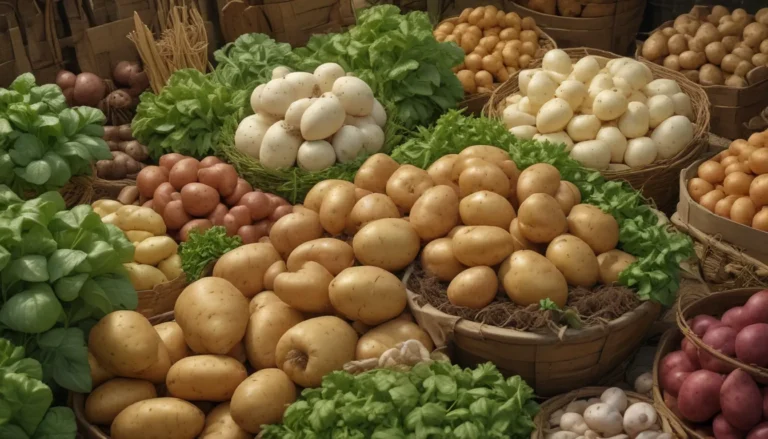Why Isn’t My Passionflower Producing Fruit?

Passionflower plants are a delightful addition to any garden space. With their magnificent blossoms, they can truly brighten up your yard. But did you know that passionflower is the same plant that produces passion fruit? It’s a fun fact that many people overlook!
While many growers are content with just nurturing the beautiful flowers, it’s important to note that most Passiflora species produce edible fruits, with some being more flavorful than others.
If you’re growing passionflowers, you have the potential to grow passion fruit as well! However, there may be times when your vine produces flowers but fails to bear fruit. In such cases, it’s crucial to troubleshoot the issue to identify the cause and find a solution.
In this comprehensive guide, we will delve into the reasons why passionflower may fail to produce fruit and provide you with practical solutions to address these concerns. Let’s explore the common culprits together:
5 Common Reasons Why Passionflower Fails to Produce Fruit
- Age
- Fertilizer
- Pollination
- Sun
- Variety
If you’re experiencing challenges with your passionflower vines or if this is your first time growing them, this guide will help set you on the right path towards successful fruit production. Let’s begin our journey!
1. Age: The Root Cause
One of the primary reasons why your passionflower vine may not be producing fruit is its age. A young plant typically won’t produce flowers and fruits until it reaches about three to four years of age. If you have recently planted your passionflower, it’s essential to be patient and give it time to mature.
Once the flowers start to form, the berries should follow suit. If you notice that the plant is not bearing fruit despite having blooms, there may be other factors at play, which we will explore further.
2. Fertilizer Woes
Before you resort to adding fertilizer to your passionflower vine, it’s advisable to conduct a soil test to determine its nutrient levels. Passionflowers are known to be voracious plants, but they often derive the necessary nutrients from the soil itself.
If you apply fertilizer indiscriminately and the plant absorbs excess nitrogen, it may prioritize leaf growth over flowering and fruiting. This can result in the development of weak, non-fruiting flowers.
To avoid this scenario, perform a soil test annually and only supplement the soil with the nutrients that are deficient. If you accidentally over-fertilize, flush the soil with water to rectify the imbalance.
For more tips on fertilizing your vines for optimal health, refer to our comprehensive guide on the subject.
3. Pollination Predicament
Like many other flowering plants, passionflowers require pollination to set fruit. If your passionflower vine is isolated in a location where it doesn’t attract pollinators like bees, the flowers may remain unpollinated, leading to fruitless blooms.
To address this issue, you can take steps to attract pollinators to your garden. Refer to our in-depth guide on encouraging bees, butterflies, and other pollinators to visit your garden space and facilitate the pollination process.
Passionflowers rely on insects or animals, such as honeybees and carpenter bees, for pollination. If natural pollination efforts prove unsuccessful, you can resort to hand-pollination by transferring pollen from the anthers to the stigma of the flower using a paintbrush or toothpick.
It’s essential to take note of any self-incompatible hybrids, cultivars, or species in your collection, as these plants require cross-pollination with another compatible variety to produce fruit successfully. Check the plant tags for compatibility information.
4. Sunlight: Shedding Light on the Issue
Adequate sunlight is crucial for passionflower vines to bloom and set fruit. Most species thrive in conditions with at least eight hours of sunlight per day. If your vine is not receiving sufficient sunlight, it may struggle to produce flowers and fruits.
Monitor the sunlight exposure of your plants throughout the day to determine if shading is hindering their growth. Consider relocating the vines or trimming surrounding plants to optimize sunlight exposure. However, if your vines are displaying abundant large flowers, sunlight may not be the primary issue.
5. Variety Matters
While most passionflower species, hybrids, and cultivars are capable of producing fruits, there are exceptions that may not bear significant or edible fruits. Research your specific plant variety to confirm its fruiting potential.
Common species like P. edulis and P. incarnata are known for their edible fruits. On the other hand, sterile varieties like P. ‘Damsen’s Delight’ and infrequently fruiting types like P. ‘Snow Queen’ may not be suitable choices for fruit production.
Ensure that your passionflower variety aligns with your expectations for fruit quality and yield to avoid disappointment.
Harvesting the Benefits of Passion Fruits
Passion fruits are a unique and flavorful delight that shouldn’t be missed. By addressing the underlying issues preventing your passionflower vines from producing fruit, you can savor the rewards of your gardening efforts.
Once you implement the solutions outlined in this guide, we’d love to hear about your success story! Share your experiences and insights in the comments below to inspire fellow growers.
For additional assistance in maximizing the potential of your passionflower plants, consider exploring the following informative guides:
- How to Grow and Care for Passionflower
- 7 Common Reasons Why Passionflower Fails to Bloom
- 17 of the Best Passionflower Species and Hybrids to Grow at Home
Passionflower cultivation offers a rewarding experience for gardeners, and with the right knowledge and care, you can enjoy abundant blooms and bountiful fruit harvests. Embrace the journey of nurturing these fascinating plants in your garden space!





